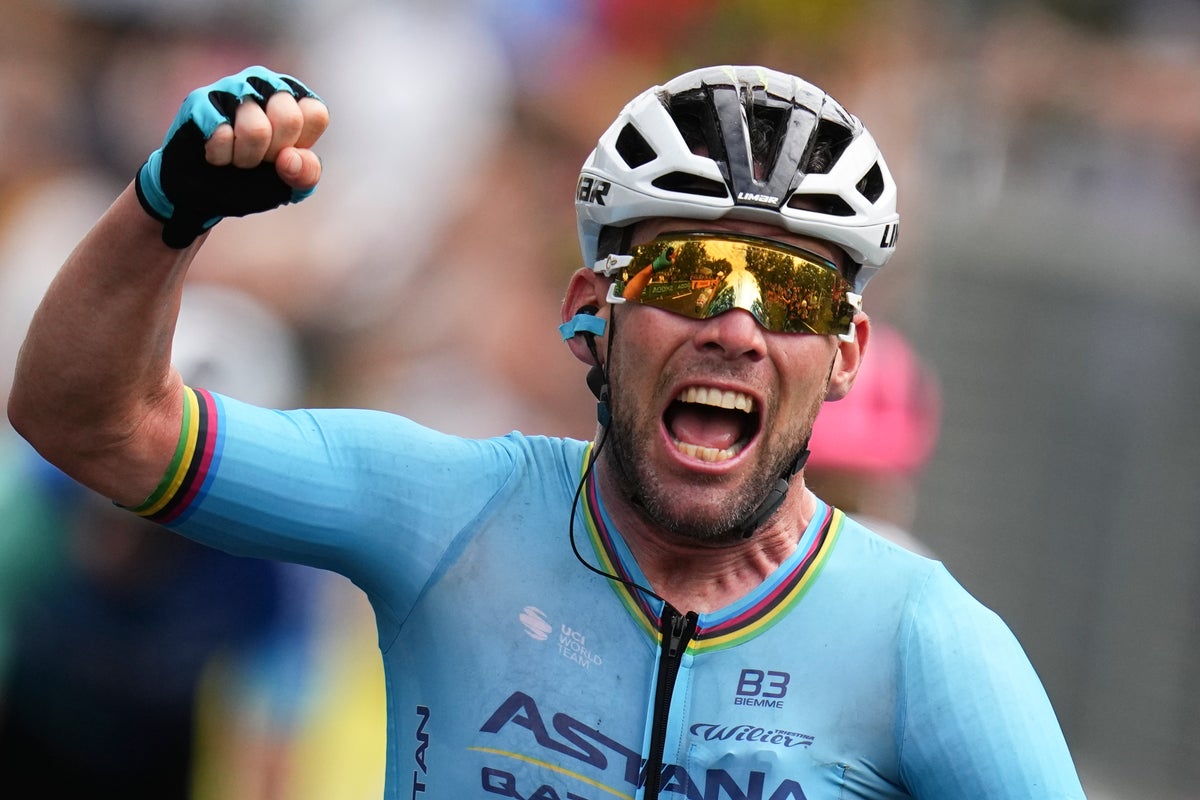
Support truly
independent journalism
Fairytale endings rarely come to pass in sport, but for Sir Mark Cavendish, his final Tour de France was the perfect way to bring the curtain down on an historic career.
The Manxman’s record-breaking 35th career Tour stage win came on the fifth day in Saint-Vulbas, the culmination of months of hard work and sacrifice from Cavendish, his family and his Astana-Qazaqstan team.
No other stage wins would follow, but Cavendish’s mission was accomplished early. The 39-year-old could savour his final days on a race which has done so much to define his career, high-fiving fans, posing for pictures and soaking up the great circus that is the biggest bike race on the planet.
Tadej Pogacar has been busy dominating the race in yellow, winning six stages of this year’s race to move his own tally to 17 at the tender age of 25.
Perhaps the Slovenian will one day challenge Cavendish’s record, but even if he does, it seems unlikely we will see the likes of the Manx Missile again any time soon.
Cavendish’s last Tour stage win came 16 years after his first. He bridged generations – when he won his first stage in 2008, Erik Zabel finished third; when Cavendish won again in 2021 Erik’s son Rick was among those he beat.
In his prime, Cavendish was an almost unstoppable force – the greatest sprinter cycling has ever seen.
Between 2007 and 2015, Cavendish piled up 133 victories including the 2011 world title, stages of all three Grand Tours, Milan-Sanremo in 2009 and so much more.
Breaking Eddy Merckx’s record seemed a matter of time. But what has made Cavendish’s story so special in recent years has been the perseverance he and those around him have shown through a series of challenges that would have seen some athletes walk away.
Few interviews with Cavendish now pass without mention of his family – and the importance he places on teaching his children never to give up – and it is a message he has lived for many years now.
After he won four stages of the 2016 Tour to reach 30, a late diagnosis of the Epstein-Barr virus was the first of a series of major setbacks which led to Cavendish being diagnosed with clinical depression.
His career might have been over when he struggled to find a contract at the end of the pandemic-hit 2020 season.
Instead he rebounded to win four stages of the 2021 Tour while racing on minimum wage for Deceuninck-QuickStep, his first Tour wins in five years moving him level with Merckx in one of the sport’s greatest comeback stories.
Cavendish was not done there. There was more contract drama at the end of the 2022 season as the team he planned to join, B&B Hotels, collapsed.
A move to Astana-Qazaqstan seemed an odd fit, but what they lacked in sprint pedigree they made up for with the belief of team boss Alexander Vinokourov, who was determined to see Cavendish go out on his own terms.
Last summer was supposed to be Cavendish’s final Tour, his impending retirement announced during the Giro d’Italia in May.
But when he crashed out on stage eight, with that 35th win yet to be earned, Cavendish’s wife Peta and Vinokourov were the first to tell him he must race one more season. As Peta said, there could be no ‘what ifs’ in retirement.
From that moment, Astana-Qazaqstan went all in on ‘Project 35’, signing Cavendish’s old team-mates Michael Morkov and Davide Ballerini to provide his lead-out and investing fortunes in perfecting every detail of his equipment.
It all paid off in Saint-Vulbas, the crowning glory on a remarkable career and was made all the more special for the manner in which Cavendish got there.
PA







